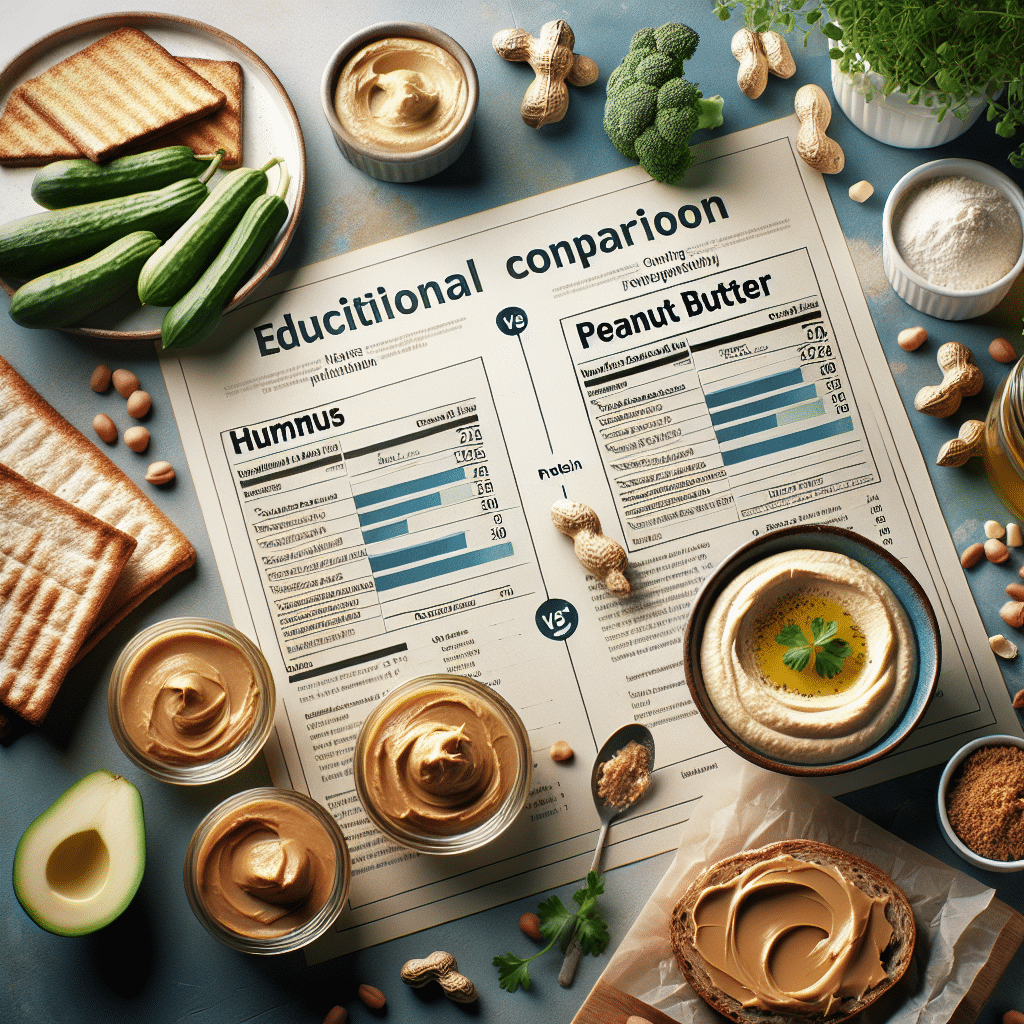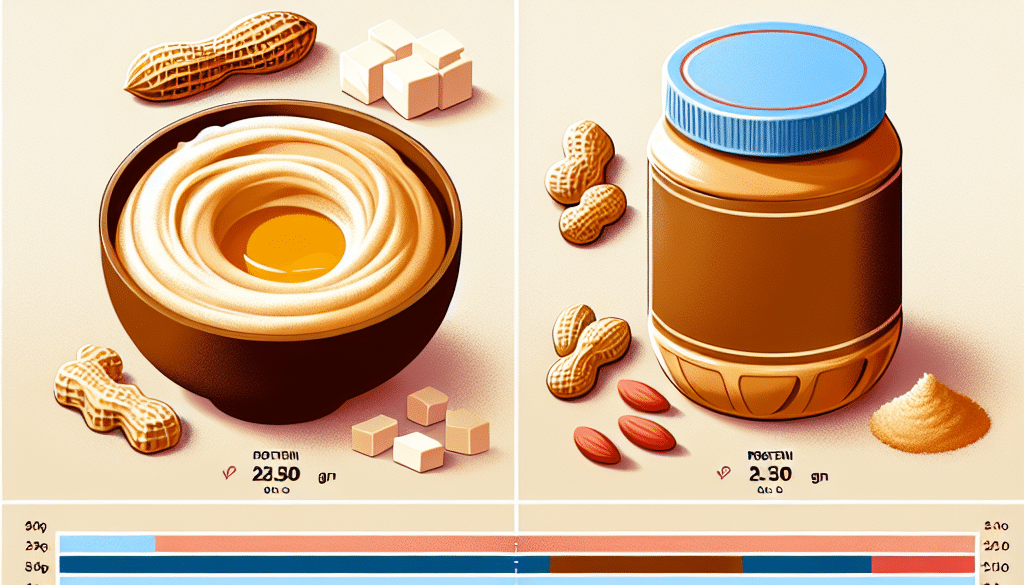Protein Comparison: Hummus vs. Peanut Butter
-
Table of Contents
- Protein Showdown: Hummus vs. Peanut Butter
- Understanding Protein and Its Importance
- Nutritional Profile of Hummus
- Nutritional Profile of Peanut Butter
- Comparing Protein Quality
- Health Benefits and Potential Drawbacks
- Health Benefits of Hummus
- Potential Drawbacks of Hummus
- Health Benefits of Peanut Butter
- Potential Drawbacks of Peanut Butter
- Usage in Diets and Recipes
- Environmental Impact
- Conclusion: Which Is the Better Protein Source?
- Discover ETprotein’s High-Quality Protein Products
Protein Showdown: Hummus vs. Peanut Butter

When it comes to selecting protein-rich foods for a healthy diet, the choices can be overwhelming. Two popular options that often come up in discussions about healthy snacks and protein sources are hummus and peanut butter. Both are beloved for their flavor and versatility, but how do they compare in terms of protein content, nutritional value, and overall health benefits? In this comprehensive article, we will delve into the world of these two protein-packed foods, comparing their nutritional profiles, health benefits, and potential drawbacks.
Understanding Protein and Its Importance
Before we compare hummus and peanut butter, it’s essential to understand why protein is such a crucial component of our diet. Protein is a macronutrient made up of amino acids, which are the building blocks of our body’s cells. It plays a vital role in building and repairing tissues, making enzymes and hormones, and supporting immune function. A diet rich in protein can also help with weight management by promoting satiety and preserving muscle mass during weight loss.
Nutritional Profile of Hummus
Hummus is a Mediterranean dip or spread made from cooked, mashed chickpeas blended with tahini, olive oil, lemon juice, garlic, and salt. Here’s a breakdown of its nutritional content:
- Protein: Hummus typically contains about 2-4 grams of protein per tablespoon.
- Fiber: It’s also a good source of dietary fiber, which aids in digestion and can help lower cholesterol levels.
- Fats: The fats in hummus are primarily unsaturated, coming from olive oil and tahini, which are beneficial for heart health.
- Vitamins and Minerals: Hummus provides a range of vitamins and minerals, including iron, folate, phosphorus, and B vitamins.
Nutritional Profile of Peanut Butter
Peanut butter is a spread made from ground, dry-roasted peanuts. It’s a staple in many households and offers the following nutritional benefits:
- Protein: Peanut butter contains about 7-8 grams of protein per two tablespoons, making it a more protein-dense option than hummus.
- Fiber: It also contains dietary fiber, although typically less than hummus.
- Fats: The fats in peanut butter are predominantly monounsaturated and polyunsaturated, which are heart-healthy fats.
- Vitamins and Minerals: Peanut butter is a good source of vitamins E and B6, magnesium, and potassium.
Comparing Protein Quality
While both hummus and peanut butter contain protein, the quality of protein is also an important factor to consider. Proteins are judged based on their amino acid profile and digestibility. Complete proteins contain all nine essential amino acids in sufficient amounts. Animal proteins are typically complete, while most plant-based proteins are not.
Chickpeas, the main ingredient in hummus, are a good source of protein but lack certain essential amino acids. However, when combined with grains like those found in pita bread, they can provide a complete protein profile. Peanut butter, on the other hand, also lacks some essential amino acids but is closer to being a complete protein than chickpeas alone.
Health Benefits and Potential Drawbacks
Both hummus and peanut butter offer various health benefits, but they also have potential drawbacks that should be considered.
Health Benefits of Hummus
- Heart Health: The unsaturated fats in hummus can help reduce the risk of heart disease.
- Weight Management: The fiber and protein in hummus can help keep you feeling full, which may prevent overeating.
- Blood Sugar Control: The low glycemic index of hummus helps maintain stable blood sugar levels.
Potential Drawbacks of Hummus
- Calories: Hummus can be high in calories if consumed in large amounts due to its oil content.
- Sodium: Some store-bought hummus brands may contain high levels of sodium.
Health Benefits of Peanut Butter
- Heart Health: The monounsaturated fats in peanut butter can help lower bad cholesterol levels and reduce heart disease risk.
- Muscle Building: The higher protein content in peanut butter makes it beneficial for muscle repair and growth.
- Antioxidant Properties: Peanut butter contains antioxidants like vitamin E, which can help protect the body from oxidative stress.
Potential Drawbacks of Peanut Butter
- Calories: Peanut butter is calorie-dense, which can contribute to weight gain if not consumed in moderation.
- Aflatoxins: Peanuts can contain aflatoxins, which are toxic substances produced by certain molds. However, strict regulations usually keep levels in food well below harmful amounts.
Usage in Diets and Recipes
Hummus and peanut butter can be incorporated into various diets and recipes. Hummus is often used as a dip for vegetables or spread on sandwiches, while peanut butter is a popular choice for smoothies, sandwiches, and baking. Both can be part of a vegetarian or vegan diet and offer a plant-based protein alternative for those looking to reduce meat consumption.
Environmental Impact
The production of hummus and peanut butter also has different environmental impacts. Chickpea cultivation generally requires less water and has a lower carbon footprint than peanut farming. However, the environmental impact of any food product can vary greatly depending on farming practices, transportation, and processing methods.
Conclusion: Which Is the Better Protein Source?
In conclusion, both hummus and peanut butter offer unique nutritional benefits and can be part of a healthy diet. Peanut butter is higher in protein and may be more suitable for those looking to increase their protein intake for muscle building or satiety. Hummus, with its combination of fiber, protein, and healthy fats, is an excellent choice for heart health and weight management.
Ultimately, the choice between hummus and peanut butter should be based on personal dietary needs, taste preferences, and health goals. Moderation is key, and incorporating a variety of protein sources in your diet is the best approach to ensure you receive all the essential amino acids and nutrients your body requires.
Discover ETprotein’s High-Quality Protein Products
If you’re looking to enhance your diet with high-quality protein sources, consider exploring ETprotein’s range of products. ETprotein is a reputable peanut protein Chinese factory manufacturer and supplier, offering a wide selection of organic bulk vegan protein and plant proteins. Their products are characterized by a neutral taste, non-GMO, and allergen-free attributes, catering to a diverse range of industries.
ETprotein’s specialization includes exporting and delivering tailor-made protein powder and finished nutritional supplements. Their extensive product range covers sectors like Food and Beverage, Sports Nutrition, Weight Management, Dietary Supplements, Health and Wellness Products, and Infant Formula, ensuring comprehensive solutions to meet all your protein needs.
As a trusted company by leading global food and beverage brands and Fortune 500 companies, ETprotein reinforces China’s reputation in the global arena. For more information or to sample their products, please contact them and email sales(at)ETprotein.com today.
About ETprotein:
ETprotein, a reputable peanut protein Chinese factory manufacturer and supplier, is renowned for producing, stocking, exporting, and delivering the highest quality organic bulk vegan protein and plant proteins. They include Organic rice protein, clear rice protein, pea protein, clear pea protein, pumpkin seed protein, sunflower seed protein, mung bean protein, peanut protein etc. Their offerings, characterized by a neutral taste, non-GMO, allergen-free attributes, cater to a diverse range of industries. They serve nutraceutical, pharmaceutical, cosmeceutical, veterinary, as well as food and beverage finished product distributors, traders, and manufacturers across Europe, USA, Canada, Australia, Thailand, Japan, Korea, Brazil, and Chile, among others.
ETprotein specialization includes exporting and delivering tailor-made protein powder and finished nutritional supplements. Their extensive product range covers sectors like Food and Beverage, Sports Nutrition, Weight Management, Dietary Supplements, Health and Wellness Products, and Infant Formula, ensuring comprehensive solutions to meet all your protein needs.
As a trusted company by leading global food and beverage brands and Fortune 500 companies, ETprotein reinforces China’s reputation in the global arena. For more information or to sample their products, please contact them and email sales(at)ETprotein.com today.












